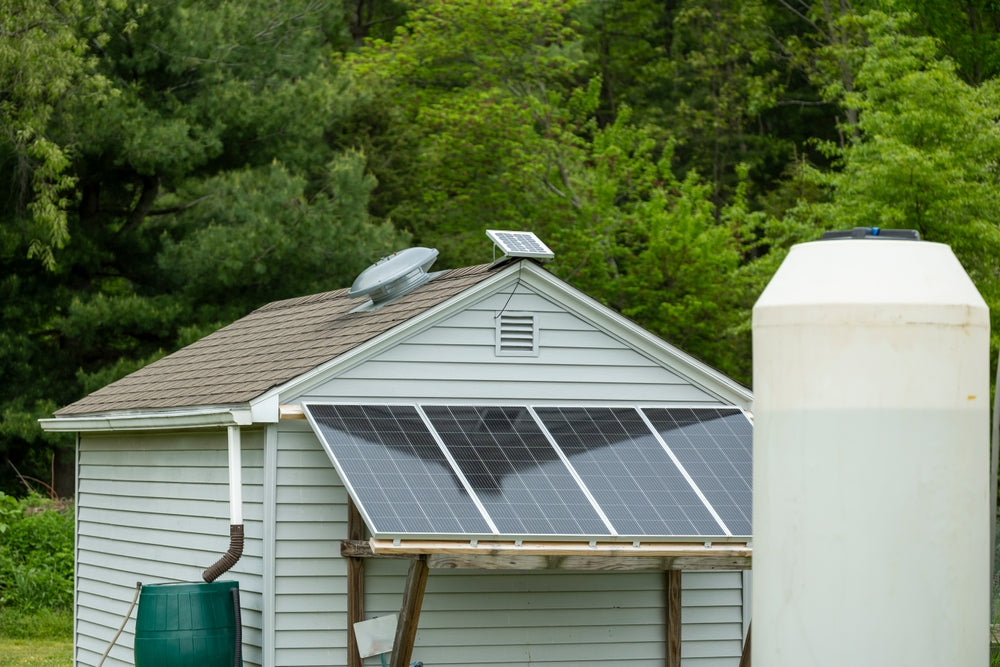
Off-grid living is a lifestyle choice that offers independence and sustainability, often centered on using renewable energy. Many people have turned to solar panels for off-grid homes as a primary power source in recent years. Solar technology promises reliable, eco-friendly energy, but the question remains: can solar panels sustain your home when you go completely off-grid? Let’s explore how solar energy works in this context, the necessary equipment, and how to optimize solar panel usage for off-grid living.
Understanding Off-Grid Solar Power Systems
An off-grid solar power system is a self-sufficient energy setup that is not connected to the public electricity grid. Unlike grid-tied systems that rely on backup electricity from the grid, off-grid setups must generate and store all the energy needed to power your home. Solar panels for off-grid homes are at the heart of this system, capturing sunlight and converting it into usable electricity.
However, solar panels alone are not enough to make your home off-grid. You’ll also need a battery storage system to hold the energy produced during sunny periods for use when the sun isn’t shining, such as at night or on cloudy days. Additionally, an inverter is required to convert the direct current (DC) electricity produced by the panels into alternating current (AC), which is what most household appliances use.
Can Solar Panels Meet All Your Energy Needs?
The capacity of solar panels for off-grid homes to sustain your home depends on several factors. The most crucial one is the energy demand of your household. Large appliances like refrigerators, washing machines, and heating systems consume substantial amounts of electricity. Calculating your total energy consumption can help you determine how many solar panels and how much battery storage you’ll need.
On average, a typical solar panel can produce around 300 watts of electricity per hour of direct sunlight. Depending on your location, the average home may need between 15 to 30 panels to generate enough electricity. But if you live in a larger home or one with higher energy needs, the number of panels required will increase.
Additionally, energy efficiency plays a huge role in whether solar panels for off-grid homes can meet your needs. Well-insulated homes, use energy-efficient appliances, and are designed to maximize sunlight intake are far more likely to thrive off-grid using solar energy alone.
Battery Storage: A Key Element
The sun doesn’t shine all day, which means you need a way to store energy for later use. This is where battery storage comes in. Batteries designed for solar panels for off-grid homes store the excess electricity generated during sunny periods, so you have power available at night or during bad weather.
Modern lithium-ion batteries are commonly used because they offer greater efficiency and longer life spans compared to traditional lead-acid batteries. The number and size of batteries you need will depend on your household’s energy consumption and the amount of sunlight you typically receive. It’s important to choose a battery with enough capacity to cover several days of energy use, in case of extended periods without sun.
Solar Panels and Seasonal Variations
One of the challenges of relying solely on solar panels for off-grid homes is dealing with seasonal variations in sunlight. In many regions, sunlight is abundant during the summer months, but much less so during winter. Shorter days and cloudy conditions can reduce the amount of energy your panels produce.
To address this issue, you can invest in more panels to maximize energy capture during the low-sun periods or install a backup power source like a generator. Alternatively, you could reduce your energy consumption during the winter months by using energy-efficient heating and lighting solutions.
Additionally, the angle and positioning of your solar panels are crucial for maximizing energy output throughout the year. Installing panels at the right tilt and ensuring they face the sun can significantly improve efficiency, especially during seasons with less sunlight.
The Role of Inverters
Inverters are a critical component of any off-grid solar power system. Solar panels generate electricity in the form of direct current (DC), but most household appliances run on alternating current (AC). Inverters convert the DC electricity from your solar panels for off-grid homes into usable AC electricity.
There are different types of inverters available, including pure sine wave and modified sine wave inverters. Pure sine wave inverters are generally recommended for off-grid systems, as they produce cleaner power, which is better for sensitive electronics and appliances.
Cost Considerations for Going Off-Grid
Installing solar panels for off-grid homes can be a significant investment. However, it’s important to consider the long-term savings on energy bills, especially if you live in a remote area where connecting to the grid is expensive or unreliable.
The cost of going off-grid varies depending on the size of your home, energy consumption, and the specific equipment you choose. Solar panels, batteries, inverters, and installation costs all factor into the total price. Government incentives and rebates can also help reduce the upfront cost of your off-grid solar system.
Maintenance and Longevity of Solar Panels
While solar panels for off-grid homes require minimal maintenance, regular cleaning, and inspections are necessary to keep them functioning efficiently. Dust, dirt, and debris can accumulate on the surface of the panels, reducing their ability to absorb sunlight. Fortunately, maintaining your solar panels is relatively easy – simply cleaning them a few times a year can help ensure maximum energy output.
The lifespan of solar panels is another factor to consider. Most panels come with a warranty of 20 to 25 years, and many continue to produce electricity well beyond that. Battery storage systems, on the other hand, may need to be replaced after 10 to 15 years, depending on the type of battery and how frequently it’s used.
Diversifying Your Off-Grid Energy Sources
While solar panels for off-grid homes can provide the bulk of your energy, it's often wise to diversify your energy sources for additional reliability. Supplementing solar power with wind turbines or hydropower can ensure a steady energy supply, especially during periods of low sunlight. Hybrid systems that combine solar with other renewable sources can enhance your overall energy resilience. This approach minimizes the risk of power shortages and ensures your home remains fully functional in any weather condition.
Is Solar Power Enough for Off-Grid Living?
For many homeowners, the answer is yes – solar panels for off-grid homes can sustain your energy needs if your system is designed properly. With the right combination of solar panels, battery storage, and energy-efficient appliances, you can live comfortably off-grid without sacrificing modern conveniences. However, it’s essential to assess your energy consumption accurately and invest in a system that can handle your household’s demands year-round.








